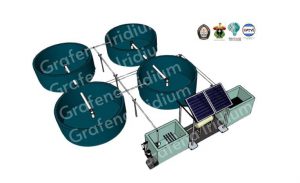Innovation in the aquaculture sector is essential for enhancing the efficacy and productivity of fisheries. The Grafena Iridium team, which includes Tiurma Fransiska Simanullang as chairman and associates Jeni Laura Tesalonika and Putri Sekar Kinanti, has developed the most recent shortcut. Where the polymonia (Polyvinylidene Fluoride for Ammonia Removal) concept is a refinement of the RAS (Recirculating Aquaculture System) by utilizing membrane filtration technology and ammonia sensors to remove ammonia from water, with solar panels serving as an alternative source of electrical energy. This discovery has the potential to significantly advance the art of sustainable, water-saving, and environmentally responsible fish aquaculture, resulting in a higher quality of fish. Ammonia levels are one of the numerous water quality parameters that are crucial in aquaculture ecosystems. Ammonia that accumulates in aquatic systems must be eliminated, as it has the potential to be toxic, damage fish tissue, and even result in fish mortality. The inclusion of an ammonia sensor will facilitate the monitoring of water quality by fish producers.

Fish pond design by SketchUp
The innovative pool design, layout, and water circulation, as well as the use of solar panels as alternative energy to power pumps, aerators, UV filters, and sensors, are among the advantages that set this project apart. These features are based on sustainability and environmentally friendly principles, which reduce reliance on energy sources. it is conventional to achieve the Indonesian government’s objective of achieving zero carbon emissions by 2060 through the Framework of Indonesia. This was explicitly communicated by the Coordinating Minister for Maritime Affairs and Investment 2022 at the G20 event in Bali, Indonesia.
As the Head of the Industrial Chemical Engineering Technology D4 Study Program and supervisor, Endy Yulianto, S.T., M.T., is instrumental in providing the Iridium Graphene team with continuous support. The development and refinement of innovations in the RAS design have been facilitated by discussions with him. The Indonesian Vocational Higher Education Forum (FPTVI) convened the OLIVIA IX 2024 competition, which was the context in which this initiative was developed. The Grafena Iridium team has been selected as finalists for the five best works and will exhibit their work in order to compete for the championship title at Hasanuddin University, thanks to this design innovation. The innovation that has been implemented is a prime example of how technology and collaboration can generate solutions that have a beneficial effect on the future.


Recent Comments